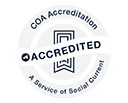Improving Your Finances
Finding a job, managing your money and creating a budget may seem confusing, but knowing where to go and how to start can help prepare you for success.
Setting up a bank account
Having a savings account, checking account and a debit card can help you keep your finances organized and your money safe. To learn more about different types of bank accounts, click here.
To set up an account you will likely need:
- A valid, government-issued photo ID.
- Personal information such as your name, date of birth, address, social security number and phone number.
- Cash, check or money order to deposit in your account.
Credit cards
Credit cards provide the freedom of purchasing items now and paying later. However, they come with a price. If you don’t pay your credit card bill in full every month you will have to pay high interest charges. While credit cards can help you establish a good credit history, there are some general rules you should always follow:
- Only use them for purchases you’ll be able to pay off when your bill is due (so you won’t pay any interest) or for absolute emergencies (you will have to pay interest).
- Always make at least the minimum required monthly payments, or else you’ll be charged late fees, interest will grow and your credit history will be damaged.
- The best way to use a credit card is if you pay your entire bill every month.
- If you’re unsure whether or not you should get a credit card or use one to pay for something, don’t!
Visit the Consumer Financial Protection Bureau’s Frequently Asked Questions for answers to questions about credit card interest rates and billing problems, credit counseling, bank and checking accounts, payday loans, money management and student loan debits and payment.
Budgeting
Before you begin your housing search, make a budget that includes all of your income and expenses. Make sure to account for taxes taken out of your paycheck. Ideally you will spend no more than 30 percent of your monthly take-home income on housing (rent and utilities).
Choose an apartment that gives you room in your budget to buy other things you need. If you will be struggling to pay for food or other basic needs, you can’t afford the apartment. By being honest with yourself about your budget, you are making sure that the rental you choose is a good fit.
Be sure to factor in the costs of your first month’s rent; security deposit or move-in fee; deposits for gas, electric and water; telephone and cable hookups; and furniture.
Utilities like gas, electric, water and trash can add to your housing costs quickly. Before you sign a lease, make sure you know what, if any, utilities are included in your rent.
Many major utilities offer “budget billing.” If you enroll in budget billing, the company estimates the likely cost of gas or electricity for your address and spreads the cost out over the entire year to help you maintain a budget and avoid getting stuck with high cooling bills during the summer or heating bills during the winter.
| Need help or want to know more? The Illinois Housing Handbook, available in English and en español, provides a wealth of information to help make obtaining and maintaining housing easier and less confusing, especially for first-time renters. |


